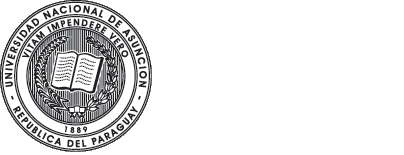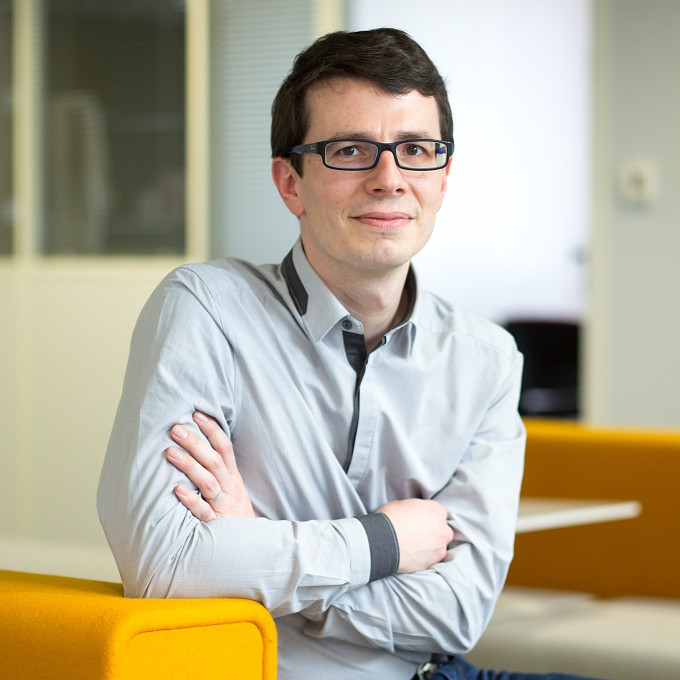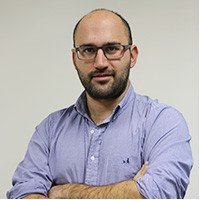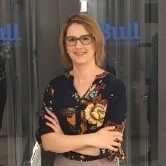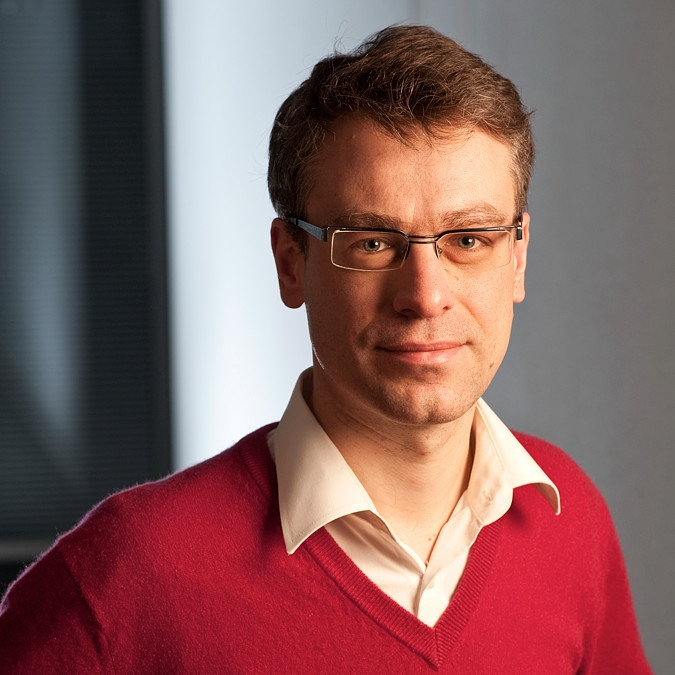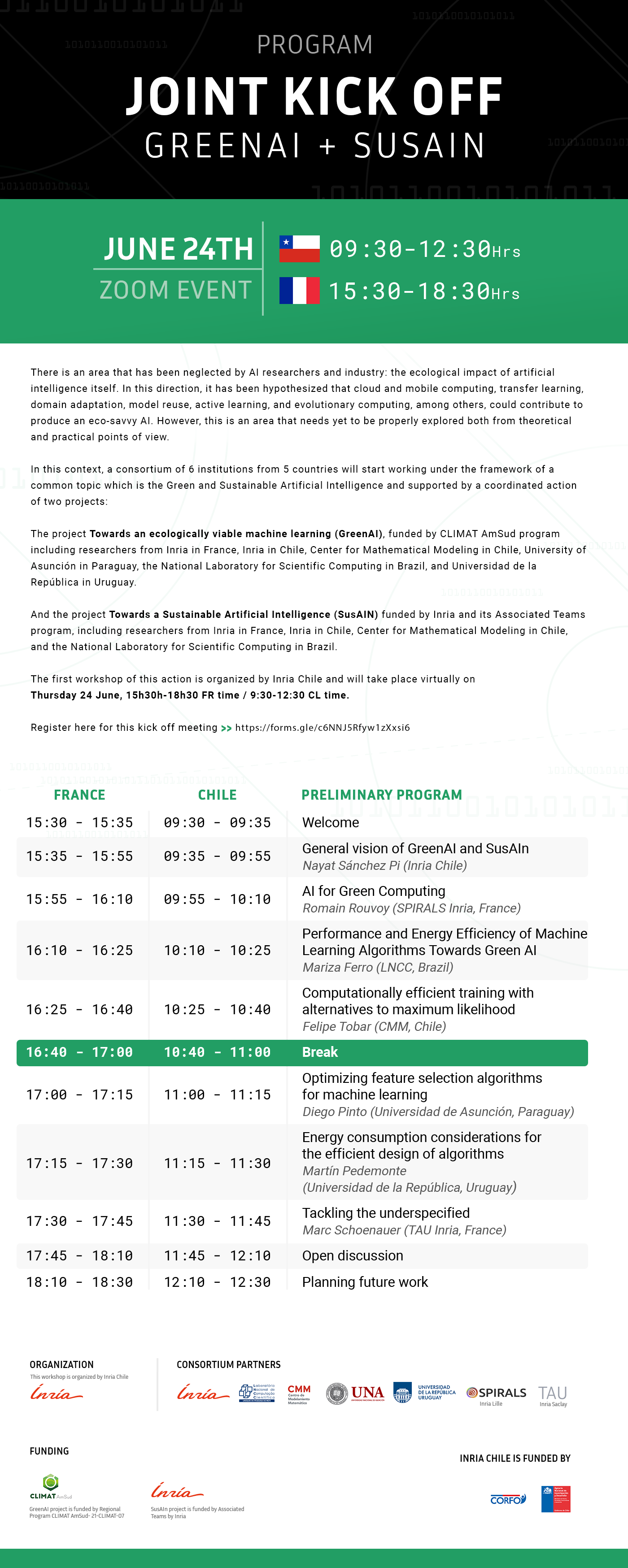about
Artificial intelligence methods are essential components of any renewable energy action. As, in order to make renewable energies operational, efficient and viable it is necessary to model many complex phenomena and to optimize many processes.
There is, however, an area that has been neglected by researchers and industry: the ecological impact of artificial intelligence itself. Only recently some light has been cast in this direction:
- It has been forecasted that by 2030 half of the world’s electric energy consumption with be attributed to computing facilities.
- Recent studies show the design and training of a state of the art machine learning models produced the same amount of CO2 as six medium cars during their lifespan. This raises many concerns on how to make an ecologically-viable artificial intelligence.
In this context, a consortium of 6 institutions from 5 countries started working under the framework of a common topic which is the Green and Sustainable Artificial Intelligence and supported by a coordinated action of two projects:
- The project Towards an ecologically viable machine learning (GreenAI), coordinated by Inria Chile and Inria and funded by CLIMAT AmSud program. It includes researchers from Inria in France, Inria in Chile, Center for Mathematical Modeling in Chile, University of Asunción in Paraguay, the National Laboratory for Scientific Computing in Brazil, and Universidad de la República in Uruguay.
- And the project Towards a Sustainable Artificial Intelligence (SusAIN) funded by Inria and its Associated Teams program, including researchers from Inria in France, Inria in Chile, Center for Mathematical Modeling in Chile, and the National Laboratory for Scientific Computing in Brazil.
goals
We propose to study and tackle the problem of the energy requirements and the environmental impact modern ML models.
The scientific goals of this project is to conceive a systemic and multi-component approach to this problem that involves: cloud and mobile computing, transfer learning, model reuse, active learning, and evolutionary computing, among others. This is a topic that needs yet to be properly explored both from theoretical and practical points of view.
Apart from the scientific goals already stated, this project also aims at promoting the exchange of technology and knowledge between the teams, the exchange of postgraduate students and researches, and improving the collaboration between partners from South America -Brazil, Chile, Paraguay and Uruguay- and France.
Consequently, the goals of the project can be expressed as:
- Starting at hardware level, we need to rethink the hardware substratum. Here, it is unlikely that we could get rid of GPUs at training time but at use time there are alternatives like Field Programmable Gate Arrays (FPGAs), or Application- Specific Instruction-set Processors (ASIPs), etc. Similarly, we should investigate the use of low-precision computing relaxing the quality of the floating-point representation.
- Cloud computing can be used to move computation to areas where energy can be obtained from renewable sources even to move code around the planet adapting to the availability of energy.
- Understanding how to improve experimentation. Here, we need to extend the use of optimization methods like evolutionary approaches that can be applied to narrow the search process of hyperparameters to areas of high potential. The use of Human-Computer interaction tools and visualization tools can be used to understand how the learning process is progressing.
- Another high-potential goal is to apply, online learning and self-adapting model topologies that fit themselves automatically to the complexity of the problem being solved.
- Last, and certainly not least, we must further study how to reuse trained models and perform transfer learning (Schmidhuber, 2015) on them, that is to fine-tune a pretrained model to solve a different problem than the one it was originally created for. Here, we can also take advantages of active learning algorithms (Lughofer, 2012) that can attain accuracy with fewer training labels if it carefully selects the data from which it learns.
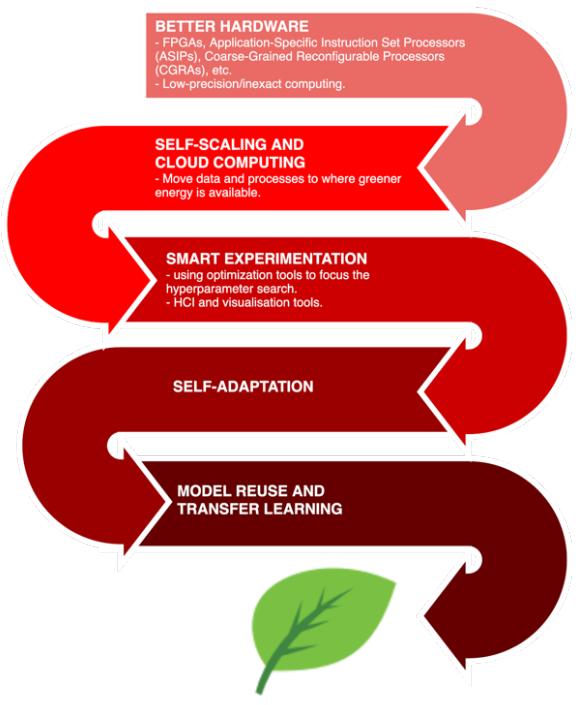
team
GREEN AI COORDINATION

Nayat Sánchez-Pi
International Coordinator and Chilean coordinator
Chilean PI - Green AI
Inria Chile
Chile
Linkedin
SUSAIN COORDINATION
LOCAL COORDINATORS
RESEARCHERS
- Dr. Ginés Guerrero, Centro de Modelamiento Matemático
- Dr. Jocelyn Dunstan, Centro de Modelamiento Matemático
- Dr. Martín Pedemonte, Universidad de la República
- Dr. Pablo Ezzatti, Universidad de la República
- Dr. Héctor Cancela Universidad de la República
- Dr. Ernesto Dufrechou, Universidad de la República
- Jimena Ferreira, Universidad de la República, PhD Student
- Rodrigo Gallardo, Universidad de la República
- Manuel Freire, Universidad de la República
- Dr. Marcos Villagra, Universidad Nacional de Asunción
- Dr. José Colbes, Universidad Nacional de Asunción
- Dr. Andrés Vignaga, Inria Chile
- MSc. Hernán Lira, Inria Chile
- Dr. Hugo Carrillo, Inria Chile
- Mohamed Chakib Belgaid, Spirals/Inria, PhD student
- Guillaume Fieni, Spirals/Inria, PhD student
- Zakaria Ournani, Spirals/Inria, PhD student
- Maryam Rahmani, Spirals/Inria, PhD Student
- Daniel Romero, Spirals/Inria
- Dr. Michèle Sebag, Tau/Inria
- Vinícius Prata Klôh, LNCC, MSc Student
- Gabrieli Dutra Silva, LNCC, MSc Student
- André M. Yokoyama, Laboratório Nacional de Computação Científica, PhD Student
- Dr. Bruno Schulze, Laboratório Nacional de Computação Científica
FORMER MEMBERS
- Juan Carlos Maureira
- Rodolfo Palma
- MSc. Taco de Wolff
- Jou-Hui Ho
publications & events
Workshops and other events
-
KICK-OFF WORKSHOP 2021 – Green and Sustainable Artificial Intelligence 2021. Sánchez-Pi, N. and Martí, L. (org). 24 Jun 2021. Program.
-
WCCI 2020 - IEEE WCCI 2020 Cross-Disciplinary Special Session CDSS-09 “Green AI: Sustainability and evolutionary and machine learning solutions”. Sánchez-Pi, N. and Martí, L. (org). 24 Jul 2020. Program.
-
ACM GECCO 2020 Workshop “Green AI: Evolutionary and machine learning solutions in environment, renewable and ecologically-aware scenarios”. Sánchez-Pi, N. and Martí, L. (org). 24 Jul 2020. Program.
-
Green AI work meeting at PUC-Rio. Sánchez-Pi, N., Martí, L., and Velasco, M. (org). 03 Mar 2020, Rio de Janeiro, Brazil. Program.
-
COP25 SIDE EVENT- “Artificial Intelligence, data, models and algorithms for sustainable development”. Sánchez-Pi, N. and Martí, L. (org). Program
KEYNOTES AND TALKS
-
Sánchez-Pi, N. (2019) Astronomy, pilot scenario for the impact of AI and climate change. In 6th CMM Pucón Symposium; Data Science for frontier Astronomy, Biomedicine and Climate. Aug 6-8 2019, Pucón, Chile. Program.
news
Others
page not found
ACM GECCO 2020
ACM GECCO 2020 Workshop “Green AI: Evolutionary and machine learning solutions in environment, renewable and ecologically-aware scenarios”
There is a growing global interest in moving towards a digital transformation of the economy. This transformation is certainly needed but it should also take into account the ecological impact and viability. It is then the moment to focus on topics like these.
The objective of this workshop is to serve as a convergence hub for researchers and academics working on the application of evolutionary computing and machine learning to both the area of energy generation, production, and transformation with an ecologically-minded approach and the construction of eco-aware machine learning models and algorithms.
Program
The workshop will take place on July, 8th, 2020. All times are in the México time zone (UTC-5).
- 8:30-8:35 — Welcome and introduction
- 8:35-8:50 Mariza Ferro (Laboratório Nacional de Computação Científica, Brazil). The Convergence of Artificial Intelligence and High-Performance Computing Towards Green AI Solutions [slides]
Abstract: The convergence of High-Performance Computing (HPC) and Artificial Intelligence (AI) has become a promising approach to eco-responsible Solutions. In this interaction the HPC can be used by AI (HPC for AI) to execute and enhance the performance of its algorithms, achieving Surprising results. These results are due, at large, to the use of high computational capacity offered by HPC environments, which at the same time require a lot of energy to keep them running. Energy consumption is responsible for greenhouse gas emissions, among which CO2 is the most expressive. On the other side (IA for HPC), AI and its Machine Learning (ML) algorithms can be used to develop solutions for datacenter energy and performance optimization. In this presentation will be discussed the impact of training different ML algorithms on energy consumption and equivalent CO2 emissions for different computational architectures (ARM, GPU, and X86) is evaluated. Also, how AI is being used to the prediction of performance and energy consumption for eco-responsible solutions.
- 8:50-9:05 Priya L. Donti (Carnegie Mellon University, U.S.A.) and David Rolnick (University of Pennsylvania, U.S.A.). Tackling Climate Change with Machine Learning [slides]
Abstract: Climate change is one of the greatest challenges facing humanity, and those of us in machine learning may wonder how we can help. In this talk, we will see how machine learning can be a powerful tool in reducing greenhouse gas emissions and helping society adapt to a changing climate. From smart grids to disaster management, we explore high impact problems where existing gaps can be filled by machine learning, in collaboration with other fields.
- 9:05-9:20 Esteban Clua (Universidade Federal Fluminense, Brazil). Why GPUs are Green? [slides]
- 9:20-9:35 Romain Rouvoy (Université de Lille and Inria Lille, France). AI for Green Computing vs. Greening AI [slides]
Abstract: As part of our research activities, the Inria Spirals research group focuses on the design of more sustainable software solutions for various classes of distributed environments. This talk will, therefore, cover our recent contributions to i) the development of a software-defined power meter to monitor the power consumption of software and algorithms in order to ii) study of the energy footprint of AI algorithms with the objective of identifying green patterns for a more responsible adoption of AI in software solutions.
- 9:35-9:50 Nayat Sánchez-Pi and Luis Martí (Inria Research Center in Chile, Chile). Towards a Green AI: Addressing the ecological footprint of machine learning [slides]
- 9:50-10:20 — Open discussion, questions, and final remarks
Call for Papers
Download here the Call for Papers for Green AI at GECCO 2020 (PDF).
Venue
The Genetic and Evolutionary Computation Conference (GECCO) presents the latest high-quality results in genetic and evolutionary computation since 1999.
GECCO’2020 will take place at Hotel Iberostar Cancún Blkd. Kukulkan Km. 17 Zona Hotelera Cancún, Quintana Roo, MÉXICO 77500.
Update: Because of the COVID-19 outbreak the Green AI workshop, like the rest of the GECCO 2020 Conference, will be hosted on a remote electronic-only mode. See GECCO 2020 announcement regarding this.
Topics
Applications papers, like those related -but not limited- to:
- Evolutionary and optimization methods for ecology-aware and energy-aware artificial intelligence methods,
- Understanding and minimization of the ecological impact of computing,
- Renewables, wind, wave, and tidal energy production,
- Oil, gas or coal transition and hybrid energy models,
- Predictive maintenance, and
- Logistics and supply chain optimization.
Relevant methods and techniques like:
- Multi-component optimization,
- Simulation-optimization,
- Energy-aware AutoML approaches,
- Transfer learning and domain adaptation,
- Probabilistic modeling with large real-world datasets, and
- Prediction, classification, and clustering with large real-world datasets.
Important Dates
Dates have been updated as follows. Note that these dates are strict, no extensions will be granted:
- Submission opening: February 27, 2020,
- Submission deadline: April 3, 2020 April 17, 2020
- Notification of acceptance: April 17, 2020 May 1, 2020,
- Camera-ready material submission: April 24, 2020 May 8, 2020,
- Author registration deadline: April 27, 2020 May 11, 2020, and
- GECCO conference: July 8-12, 2020.
Paper Submission
Workshop papers must be submitted using the GECCO submission site. After login, the authors need to select the “Workshop Paper” submission form. In the form, the authors must select the workshop they are submitting to. To see a sample of the “Workshop Paper” submission form go to GECCO’s submission site and chose “Sample Submission Forms”.
Submitted papers must not exceed 8 pages (excluding references) and are required to be in compliance with the GECCO 2020 Papers Submission Instructions. It is recommended to use the same templates as the papers submitted to the main tracks. It is not required to remove the author information if the workshop the paper is submitted to does not have a double-blind review process (please, check the workshop description or the workshop organizers on this).
All accepted papers will be presented at the corresponding workshop and appear in the GECCO Conference Companion Proceedings. By submitting a paper, the author(s) agree that, if their paper is accepted, they will:
- Submit a final, revised, camera-ready version to the publisher on or before the camera-ready deadline
- Register at least one author before April 27, 2020, to attend the conference
- Attend the conference (at least one author)
- Present the accepted paper at the conference
Green AI at COP25!
We have organized the COP25 side event “Artificial intelligence, data, models, and algorithms for sustainable development” in the French pavilion of this event. The event was inaugurated by the Chilean Minister of Science, Andrés Couve and the French Ambassador for Climate BrigitteS. Collet.
Green AI PUC-Rio
The objective of this work meeting is to serve as a convergence hub for researchers and academics working on the application of artificial intelligence, machine learning, evolutionary computing and connected areas to both the area of energy generation, production, and transformation with an ecologically-minded approach and the construction of eco-aware machine learning models and algorithms.
The scope of this meeting is in what we have called Green AI, that is, applications of AI for understanding and modeling climate change and renewables and how to make AI itself more ecological. For example, there are reports that the CO2 generated when training a state of the art NLP model is 6 times the CO2 generated by a car in all its lifetime.
To address this we should take a multi-aspect approach involving efficient cloud computing placement. Smart optimization techniques like evolutionary algorithms, active and transfer learning, etc.
When
- March 3rd, 2020 from 9:30 to 13:00.
Where
- Departamento de Engenharia Elétrica, Pontifícia Universidade Católica do Rio de Janeiro.
- Predio Cardeal Leme, 4to andar Sala Multimeios do DEE (entrada por sala 401L).
- Rua Marquês de São Vicente, 225, Gávea, Rio de Janeiro, RJ – Brasil – 22451-900.
Program
The spirit of the meeting is to generate a productive open discussion. Therefore the program will self-adjust as the meeting progresses.
- 9:30 — 9:40 Welcome by Marley Vellasco and Nayat Sánchez.
- 9:40 — 10:30 Nayat Sánchez. Inria Research Center in Chile: Articulating collaboration.
- 10:30 — 11:00 — Coffee break
- 11:00 — 11:45 Luis Martí. The Green AI project: Status and vision.
- 11:45 — 12:25 Participant presentations (*see note below).
- 12:25 — 12:55 Devising next actions and steps.
- 12:55 — 13:00 Final remarks.
*Note: We encourage participants to come with a brief presentation or summary of different research activities or interests connected to the project to present and discuss them.
KICKOFF 2021
IEEE WCCI 2020
IEEE WCCI 2020 Cross-Disciplinary Special Session CDSS-09 “Green AI: Sustainability and evolutionary and machine learning solutions”
The objective of this special session is to serve as a convergence hub for researchers and academics working on the application of evolutionary computing and machine learning to both the area of energy generation, production, and transformation with an ecologically-minded approach and the construction of eco-aware machine learning models and algorithms.
Venue
The IEEE World Congress on Computational Intelligence (IEEE WCCI) is one of the world’s largest technical event in the field of computational intelligence. WCCI 2020 features the flagship conference of the Computational Intelligence Society: The 2020 International Joint Conference on Neural Networks (IJCNN 2020), the 2020 IEEE International Conference on Fuzzy Systems (FUZZ-IEEE 2020), and the 2020 IEEE Congress on Evolutionary Computation (IEEE CEC 2020) under one roof.
It encourages cross-fertilization of ideas among the three big areas and provides a forum for intellectuals from all over the world to discuss and present their research findings on computational intelligence.
IEEE WCCI 2020 will be held in Glasgow, Scotland, UK, from 19 to 24th July 2020.
Topics
In particular, we welcome related to -but not limited to- areas like:
- Evolutionary and optimization methods for ecology-aware and energy-aware artificial intelligence methods,
- Understanding and minimization of the ecological impact of computing,
- Renewable, wind, wave, and tidal energy production,
- Oil, gas or coal transition and hybrid energy models,
- Predictive maintenance, and
- Logistics and supply chain optimization.
Relevant methods and techniques like:
- Multi-component optimization,
- Simulation-optimization,
- Energy-aware AutoML approaches,
- Transfer learning and domain adaptation,
- Probabilistic modeling with large real-world datasets, and
- Prediction, classification, and clustering with large real-world datasets.
Important dates
- Paper submission deadline: 15 Jan 2020 30 Jan 2020 (submission deadline has been extended!)
- Paper Acceptance Notification: 15 Mar 2020.
- Final Paper Submission and Early Registration Deadline: 15 April 2020.
- IEEE WCCI 2020 Conference: 19-24 July 2020, Glasgow, Scotland, UK.
Submission
Papers submitted to this Special Session should follow the same submission and formatting guidelines as other papers of WCCI 2020. For more information, please refer to WCCI 2020 submission page.
This special session is associated with IEEE CEC 2020. When submitting your paper, go to the CEC paper submission link https://ieee-cis.org/conferences/ijcnn2020/upload.php, in the main research topic select “CDSS-09 Special Session on Green AI: Sustainability and Evolutionary and Machine Learning Solutions”.




